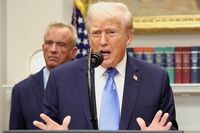On September 24, 2025, President Donald Trump signed a controversial executive order labeling anti-fascist groups and ideologies—commonly referred to as Antifa—as domestic terrorists, sparking a fierce national debate over constitutional rights, executive power, and the boundaries of political dissent. The move, which follows Trump’s earlier social media proclamations and public statements, has been met with sharp criticism from legal experts, civil liberties advocates, and historians, who warn that the order is not only legally baseless but could also have chilling effects on free speech and political activism in the United States.
The executive order, described by Fox News as part of Trump’s broader effort to dismantle what his administration calls “domestic terrorism networks,” explicitly targets Antifa and similar left-wing groups. The White House characterized the measure as a necessary step to address what it views as extremist threats, with Trump himself declaring at a recent event, “Antifa is terrible,” and confirming, “It’s something I would do, yeah,” when asked about the designation. According to NBC News, the order is a direct follow-up to Trump’s public vow to take action against groups he associates with anti-fascist activism.
Yet, as the Civil Liberties Defense Center (CLDC) and other civil rights organizations have pointed out, the very premise of the order is fraught with legal and factual problems. Antifa, they argue, is not an organization in any traditional sense. “Antifa is not an organization or an ‘enterprise.’ There are no ‘members.’ It is a social movement opposed to fascism, similar to feminism or anti-racism—not a single group or entity,” the CLDC stated in a detailed response. The group emphasized that antifascist beliefs are widely held across the American public and are protected by the First Amendment, which safeguards freedom of speech and association.
This lack of formal structure is not a trivial detail. As The Washington Post and other outlets have reported, U.S. law provides mechanisms for designating foreign groups as terrorist organizations, but there is no equivalent legal authority for labeling domestic groups in this way. The relevant statute, 18 U.S.C. 2339A, applies only to foreign terrorist organizations, and the Supreme Court’s 2010 decision in Holder v. Humanitarian Law Project made it clear that attempts to criminalize support for domestic groups on similar grounds would not survive First Amendment scrutiny. “Congress could [not] extend the same prohibition on material support at issue [in this case regarding a foreign org] to domestic organizations,” wrote Justice John Roberts in the majority opinion.
Despite these clear legal precedents, the Trump administration’s executive order references “material support” provided by anyone “claiming to act on behalf of Antifa” to “any and all illegal operations—especially those involving terrorist actions”—without even citing the federal material support statute. Critics have described the wording as “sloppy,” noting that it fails to specify how such support would be defined or prosecuted, and raises serious questions about due process and the rule of law.
The order’s vagueness is perhaps its most troubling feature. According to NBC News and NOTUS, there is widespread concern among progressive groups and activists that the administration’s broad discretion in defining “Antifa” affiliates could lead to fishing expeditions targeting anyone who publicly condemns fascism. Dylan Hedtler-Gaudette of the Project on Government Oversight told NOTUS, “I wouldn’t put it past them to try and contort and twist that into somehow being supportive of terrorism.” The fear is that the executive order, though legally toothless, could be used to justify increased surveillance, harassment, or even prosecution of political opponents, donors, and activists under the guise of national security.
Such concerns are not merely hypothetical. The CLDC warns that the order could pave the way for greater criminalization of political activism, including the deployment of the military in U.S. cities to suppress protests. “The regime may use this designation to place the military in US cities to enforce the will of the dictator, and justify it as ‘fighting antifa protests,’” the group cautioned. They also noted that similar tactics have been used in the past to target right-wing extremist groups, but those efforts relied on established criminal enterprise laws like RICO, not on dubious executive declarations.
Historically, antifascist activism in the United States has deep roots. The Smithsonian’s “A Brief History of Anti-Fascism” recounts the story of Eluard Luchell McDaniels, an African American who fought against fascist forces in the Spanish Civil War in the 1930s. McDaniels saw anti-fascism and anti-racism as inseparable causes, a sentiment echoed by many contemporary activists. “I saw the invaders of Spain [were] the same people I’ve been fighting all my life,” McDaniels is quoted as saying. The anti-fascists of today, the CLDC argues, are heirs to nearly a century of struggle against racism and authoritarianism.
Trump’s attempt to label antifascists as domestic terrorists is not without precedent. In 2017, he made a similar push, but the effort fizzled after his own FBI director acknowledged that Antifa is an ideology, not an organization, and thus could not be designated as a federal terror group. Nothing has changed in the intervening years regarding the constitutional or legal framework governing such designations.
Legal scholars across the political spectrum agree that the latest executive order has no binding legal effect. Journalist and historian Garrett Graff dismissed the order as “a random tweet on White House letterhead.” Still, many warn that the symbolic power of such a declaration should not be underestimated. “Just because this is absurd doesn’t mean it’s not dangerous,” wrote one commentator for NBC News, highlighting the risk that vague or unconstitutional directives can still inflict real harm before being struck down by the courts.
For those targeted by the order or swept up in its broad definitions, the CLDC offers pro bono legal support and resources to help activists understand and assert their rights. “We offer pro bono legal representation for people who are targeted for their political activism and constitutionally protected activities,” stated Lauren Regan, founder and Director of Litigation & Advocacy at the CLDC.
As the nation grapples with the fallout from the executive order, the episode serves as a stark reminder of the enduring tension between security and liberty, and the ongoing struggle to define the boundaries of dissent in American democracy. For many, the fight against fascism—and the defense of constitutional rights—remains as urgent as ever.



